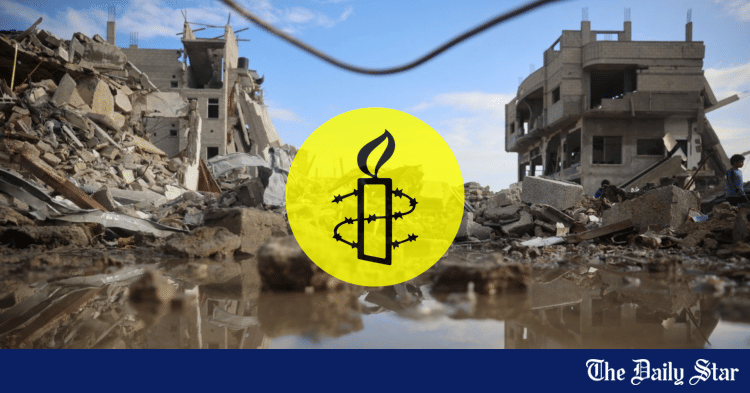Israel treating Palestinians ‘as a subhuman group'
Says Amnesty Int'l, accuses Israel of 'committing genocide' in Gaza
Amnesty International yesterday accused Israel of "committing genocide" against Palestinians in Gaza since the start of the war last year, saying its new report was a "wake-up call" for the world.
The London-based rights organisation said its findings were based on satellite images documenting devastation, fieldwork and ground reports from Gazans as well as "dehumanising and genocidal statements by Israeli government and military officials".
Israel angrily dismissed the findings as "entirely false", denouncing the report as "fabricated" and "based on lies".
Amnesty chief Agnes Callamard accused Israel of treating the Palestinians in Gaza "as a subhuman group unworthy of human rights and dignity, demonstrating its intent to physically destroy them.
"Our damning findings must serve as a wake-up call to the international community: this is genocide. It must stop now," she said in a statement.
The Palestinian group Hamas launched an unprecedented attack on Israel on October 7, 2023, triggering a deadly Israeli military offensive on Gaza as Israeli officials vowed to crush the militant group.
The Hamas attack that sparked the war resulted in the deaths of 1,208 people in southern Israel, mostly civilians, according to an AFP tally based on official data.
Since then at least 44,580 people have been killed in Gaza, mostly civilians, according to the Hamas-run health ministry, deemed reliable by the UN.
Independent UN rights experts have accused Israel several times of genocide, and South Africa dragged the country to the UN's top court in December 2023 accusing Israel of "violating the genocide convention by promoting the destruction of Palestinians living in Gaza" in a case which is still ongoing.
But Israeli officials have repeatedly and forcefully denied all such allegations, accusing Hamas of using civilians as human shields.
"The deplorable and fanatical organisation Amnesty International has once again produced a fabricated report that is entirely false and based on lies," Israel's foreign ministry said.
"Israel is defending itself... acting fully in accordance with international law", it added.
But Callamard insisted at a press conference in The Hague that "the existence of military objectives does not negate the possibility of a genocidal intent."
She said Amnesty had based its findings on the criteria set out in the UN Convention on the Prevention of Genocide.
But an Israeli army spokesperson said the report's claims "fail to account for the operational realities faced by the IDF.
"The IDF takes all feasible measures to mitigate harm to civilians during operations. These include providing advance warnings to civilians in combat zones whenever feasible and facilitating safe movement to designated areas."
Amnesty's 300-page report points to "direct deliberate attacks on civilian and civilian infrastructures where there was no Hamas presence or any other military objectives" as well as the blocking of aid deliveries, and the displacement of 90 percent of Gaza's 2.4 million people.
Palestinians have been subjected to "malnutrition, hunger and diseases" and exposed to a "slow, calculated death", Amnesty said.
The rights group, which is also due to publish a report on the crimes committed by Hamas, cited 15 air strikes in Gaza between October 7, 2023 and April 20, which killed 334 civilians, including 141 children, for which the group found "no evidence that any of these strikes were directed at a military objective".
The Amnesty report also referenced dozens of calls by Israeli officials and soldiers for the annihilation, destruction, burning or "erasure" of Gaza.
Such statements highlighted "systemic impunity" as well as "an environment that emboldens... such behaviour".
"Governments must stop pretending that they are powerless to terminate Israel's occupation, to end apartheid and to stop the genocide in Gaza," said Callamard.
"States that transfer arms to Israel violate their obligations to prevent genocide under the convention and are at risk of becoming complicit," she added.













































